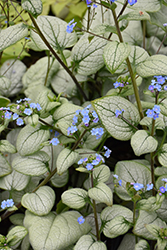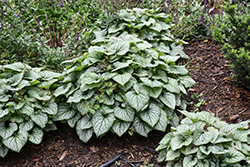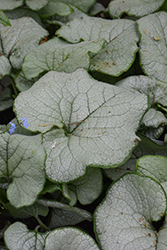>> Home
Alexandria Bugloss
Brunnera macrophylla 'Alexandria'
Height: 17 inches
Spacing: 18 inches
Sunlight:
![]()
![]()
Hardiness Zone: 4a
Other Names: Siberian Bugloss
Brand: Terra Nova
Description:
A great selection to brighten up shade gardens or borders; fast growing mounds of silvery-green foliage with airy, sky blue flowers rising above; early flowering, perfect for pollinators; excellent in containers or massed plantings
Ornamental Features
Alexandria Bugloss features airy cymes of sky blue flowers at the ends of the stems from early to late spring. The flowers are excellent for cutting. Its attractive heart-shaped leaves remain grayish green in colour with hints of silver throughout the season.
Landscape Attributes
Alexandria Bugloss is an herbaceous perennial with a mounded form. Its relatively coarse texture can be used to stand it apart from other garden plants with finer foliage.
This is a relatively low maintenance plant, and should be cut back in late fall in preparation for winter. It is a good choice for attracting bees and butterflies to your yard. It has no significant negative characteristics.
Alexandria Bugloss is recommended for the following landscape applications;
- Mass Planting
- General Garden Use
- Groundcover
- Container Planting
Planting & Growing
Alexandria Bugloss will grow to be about 14 inches tall at maturity, with a spread of 30 inches. When grown in masses or used as a bedding plant, individual plants should be spaced approximately 18 inches apart. It grows at a medium rate, and under ideal conditions can be expected to live for approximately 10 years. As an herbaceous perennial, this plant will usually die back to the crown each winter, and will regrow from the base each spring. Be careful not to disturb the crown in late winter when it may not be readily seen!
This plant does best in partial shade to shade. It requires an evenly moist well-drained soil for optimal growth, but will die in standing water. This plant should not require much in the way of fertilizing once established, although it may appreciate a shot of general-purpose fertilizer from time to time early in the growing season. It is not particular as to soil type or pH. It is somewhat tolerant of urban pollution. Consider applying a thick mulch around the root zone over the growing season to conserve soil moisture. This is a selected variety of a species not originally from North America. It can be propagated by division; however, as a cultivated variety, be aware that it may be subject to certain restrictions or prohibitions on propagation.
Alexandria Bugloss is a fine choice for the garden, but it is also a good selection for planting in outdoor pots and containers. It is often used as a 'filler' in the 'spiller-thriller-filler' container combination, providing a mass of flowers and foliage against which the thriller plants stand out. Note that when growing plants in outdoor containers and baskets, they may require more frequent waterings than they would in the yard or garden. Be aware that in our climate, most plants cannot be expected to survive the winter if left in containers outdoors, and this plant is no exception. Contact our experts for more information on how to protect it over the winter months.


